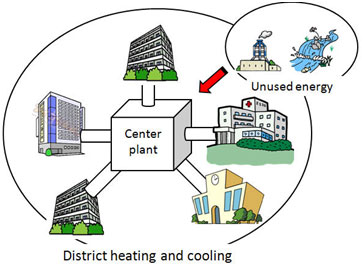When we think of marine energy, it’s about electricity from wave and tidal energy, but what about getting heat from water?
Since 2008, the small harbor town of Duindorp in the Netherlands, has been providing heat from the world’s first seawater district heating system.
Uptake pipes draw water from the sea, circulating it to homes through five miles of pipes. Because the water is a cold 35-40° F in the winter, it’s heated by a central plant before being distributed to homes, where heat pumps boost the temperature more. During the summer, when seawater reaches 70°, electric heat pumps are all that’s needed to raise the temperature enough for hot water.
It takes just 1 kilowatt-hour (kWh) of electricity to generate 15 kWh of heat, cutting emissions in half compared to natural gas heat. It would be a zero emissions process by running on solar or wind, which will likely be added since prices have come down.
800 homes in a low-income neighborhood are served with this affordable heat – less expensive than natural gas.

While district heating and heat pumps are commonplace in Europe, the challenge this project had to overcome was providing the energy from the sea at an affordable price. The biggest problem was the corrosiveness of saltwater constantly moving through pipes and mechanical systems.
These systems can be installed near any body of water and would be even less expensive near fresh water, where the problem of salt corrosion doesn’t exist. They are best used, however, as part of new construction because of the system of pipes underground.
Heat Energy From Rivers
In England, the Department of Energy is promoting the use of heat pumps to tap heat from rivers.
"It sounds like magic, but using proven technology we can now extract some of the heat in our rivers and estuaries and use that energy to heat our homes and offices," says Ed Davey, Energy Secretary.
A map released by the Department of Energy guides local governments and developers to the best spots for water-sourced heat – 40 urban rivers and estuaries.
The first system is online, providing hot water for 150 homes and a large hotel from the River Thames. The water is drawn from deep in the river where temperatures remain constant.
If this technology catches on broadly, would we be able to reverse some of ocean warming from climate change? Or could it cause problems in rivers, where warm water deep down contributes to the ecosystem?
London is embarking on a first-of-its-kind project to capture waste heat from subway tunnels for home-heating, and Seattle is exploring using waste heat from data centers.
Read about more innovations in district heat:

was involved some years back w/w heat pumps with
fresh water from river Corrib
no problem heating large building
keep me informed